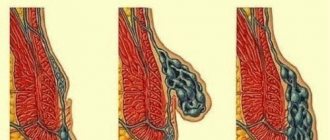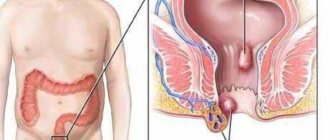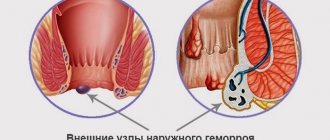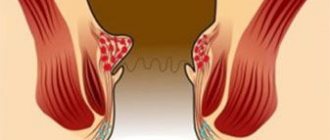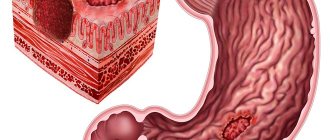Doctors have already proven that many diseases have psychosomatic roots, that is, their main cause is wrong thoughts, lifestyle and constant negative emotions. Hemorrhoids and psychosomatics are also closely related. Stress and negative experiences destroy not only the soul, but also the body. Even in ancient scientific works, a connection was established between emotions and the physical state of a person.
Unfortunately, few doctors attach importance to the psychosomatic causes of hemorrhoids, but this fact cannot be completely denied. It is necessary to know what connection exists between emotions and intestinal disease, what psychological causes cause the disease and whether mental treatment for hemorrhoids is possible.
Psychological causes of hemorrhoids
In traditional medicine, it is believed that hemorrhoidal disease is associated with inflammation of the rectum, congestion in the intestines, poor diet, excess weight and a sedentary lifestyle. But, hemorrhoids are also affected by psychological reasons :
- negative projections of the past;
- unconscious and unprocessed fear;
- suppression of emotions, feelings and own desires;
- stop of spiritual development.
These facts indicate that hemorrhoids occupy an important place in psychosomatics and have psychological roots. Any stress at work or during study can cause blood stagnation and result not only in psychological discomfort and life troubles, but also affect a person’s physical well-being. The functioning of internal organs is disrupted. Therefore, a qualified doctor must take into account the specified psychological factors that affect well-being when selecting therapy, and be sure to inform the patient about them. The doctor is obliged to tell the patient about possible psychological causes that may, in the future, despite proper treatment, lead to an exacerbation of this disease.
The psychology of hemorrhoids , according to experts, is directly related to traumatic events of the recent past or childhood. First of all, with prohibitions, fear of letting go of the situation and becoming not a victim, but the author of your life. For example, when a person forces himself to eat something he doesn’t like or do boring work. This can ultimately lead to emotional overstrain and blocking of certain areas of the body.
Louise Hay's opinion on hemorrhoids
As mentioned above, general health depends significantly on the nervous system. Most psychologists and psychiatrists agree with this point of view. For example, the author Louise Hay, popular among women, managed to substantiate the relationship between hemorrhoids and psychological state. She showed how human emotions affect the body.
Mrs. Hay guarantees that by finding the feelings and thoughts that gave rise to the development of the disease, you can quickly and effectively get rid of it. This directly applies to hemorrhoids, since its symptoms, according to the theory of this female writer, are an indicator of the patient’s emotional state.
Determining the root cause of the disease
To find the factors that provoked the development of the disease, you need to carefully delve into your own consciousness. To do this, you need to take the following steps:
- Determine the psychological reasons that gave rise to the appearance of hemorrhoids. To do this, remember all the feelings, thoughts and emotions that visited you before the development of the disease.
- Once you find a stereotype, work through it.
- Practice self-hypnosis: think that you are quickly and successfully moving towards recovery.
These simple actions, performed systematically every day, will help over time to get rid of not only physical illness, but also psychological problems.
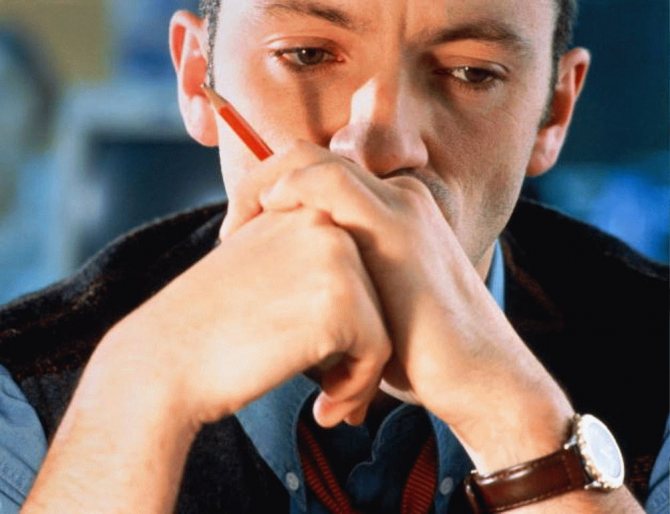
By reflecting and remembering the past, you can find out the cause of your worries and grievances.
The connection between emotions and intestinal diseases
The intestine is an organ of the digestive system that is responsible for the absorption of beneficial nutrients and the removal of undigested food debris and toxins. Intestinal problems may be associated with the following emotional manifestations:
- constipation – with conservative thoughts, uncertainty about the future, fear of change;
- diarrhea - fear and weakness in front of others, self-doubt, low self-esteem;
- diseases of the small intestine are associated with an irrational attitude to life.
Hemorrhoids are psychosomatically associated with the following provoking emotions:
- cruelty;
- sadness;
- sadness;
- fears of failure;
- fear of criticism from others;
- constant subconscious anxiety;
- hatred.
In addition, character traits such as stinginess, greed, resentment, rancor, and the desire to take revenge on someone can provoke the disease. And the more a person is fixated on negative feelings, emotions and destructive actions, the faster and more clearly the disease manifests itself. If the source of destructive emotions is not eliminated in time, the disease will not be completely cured. It will get worse from time to time.
Psychologists are sure that by suppressing their true feelings, a person is in a state of constant stress. He alone cannot understand his emotions and cope with them. When negative emotions are overwhelming, overstrain occurs in the body, which leads to the appearance and exacerbation of various diseases, including hemorrhoids. At the mental level, stagnation and psychological discomfort arise.
Psychosomatics is the main reason
The psychosomatics of hemorrhoids indicates the cessation of the spiritual development of a person as an individual. From this point of view, the causes of psychosomatic hemorrhoids that provoke the development of the disease can be divided into several groups:
Emotional or cluttering thoughts with negative experiences. These include:
- The energy accumulated in the nodes does not allow blood to circulate normally through the vessels.
- Self-control leads to the development of congestion in the rectum.
- Hemorrhoidal cones and nodes appear in the anal area.
Stress and fear. This group includes metaphysical reasons and factors that do not allow a person to relax.
- Constraint when doing work that you don’t like or the obligation to be in a job you don’t like.
- Constant dissatisfaction.
- Psychological pressure or psychological violence in the family.
- The state of a victim when a more powerful person manipulates.
Metaphysical group of factors.
This refers to violations of the lower chakra of a person. It has exhausted its energy resources or is closed.
The psychosomatic causes of hemorrhoids have been sufficiently studied and indicate that the spiritual or subtle body is asking for help. It has stopped developing and suggests that it is time for the individual to get rid of outdated attitudes. Physical ailments become a cry from the heart and a reflection of psychological problems. Scientists believe that if a doctor helps identify the psychological cause, then it will be much easier to defeat the disease.
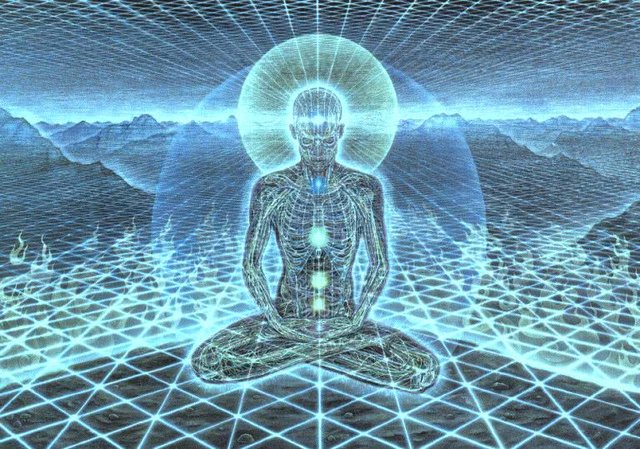
Psychosomatics in men
The reasons for the development of hemorrhoids in men are almost the same as in women. However, many men are more prone to chronic stress, find it more difficult to share their problems with other people, and are more likely to immerse themselves in work. The development of hemorrhoids in men may be associated with long-term worries about providing for their family, since a man is traditionally the “breadwinner”.
Career growth is more important for men than for women. Their fears are associated with the possibility of losing what they have achieved, the risk of starting from scratch, and the presence of rivals.
https://www.youtube.com/watch?v=4stU88MtQ9c
In personal relationships, men are more conservative. They stubbornly hold on to what they have achieved, even if their living conditions are far from ideal. Resistance to change and the transition to new solutions provokes congestion in the rectum.

The enlargement of hemorrhoids is caused by the following psychosomatic factors:
- emotional depression;
- fear and tension;
- weakening of the lower energy center of the body.
Emotional depression occurs when a person psychologically cannot part with something. Collecting trash, accumulating used and dilapidated things, stinginess - these factors lead to inflammation of hemorrhoids. A person with Plyushkin syndrome is emotionally dependent on accumulated things and is terrified of losing every item.
People who constantly experience hemorrhoids have certain character traits. These individuals are incorrigible conservatives, fearful of possible changes in life, avoiding acquaintances, but value old friends. Such people may not change the situation in their home for many years. They also tend to accumulate grievances and disappointments in their souls, which sooner or later manifest themselves as inflammation of hemorrhoidal cones.
The second psychosomatic factor is fear, persistent tension. Often, hemorrhoids occur in people who do not know how to liberate themselves, who endure an unloved job for fear of being left idle, who are dissatisfied with their financial situation, and who are susceptible to the opinions of others. Rectal diseases are often observed in men married to a strong and domineering woman.
The third factor is disruption of the lower energy center – the Muladhara chakra. This chakra is responsible for the energy of the human body, the condition of bone and fat tissue, and sexual activity. The functioning of the chakra deteriorates when a person leads an unhealthy lifestyle.
Psychosomatics of hemorrhoids in women
The psychological causes of hemorrhoids in women are associated with their impressionability and emotionality. They are more susceptible to stress than men. For example, excess weight. Women's constant dieting, self-control and fear of seeing an extra kilogram on the scale for fear of losing a husband or loved one. This only leads to “eating” negative feelings: envy of a rival, uncertainty about one’s femininity, despair, etc.
For women, a great concern is the feeling of uselessness not only for the man they love, but also for their own grown-up children.
Thus, psychologists identify the following factors that provoke hemorrhoids in women:
- poor nutrition due to stress: too frequent or, conversely, poor;
- subconscious race for the ideal figure;
- fear of getting rid of a job you don't like;
- nervous overload;
- subconscious fear of saying “no” to a tyrant man.
As a rule, if a woman is encouraged by someone from the outside, then her nutrition will normalize, uncertainty and fear will go away, and, consequently, her physical and mental state will normalize. This is due to the fact that women, due to lack of self-confidence, tend to create an unattractive image for themselves.
The most common cause of psychosomatic hemorrhoids in women is hiding true feelings and emotions.
Due to the forced passive state, constipation occurs, which can develop into hemorrhoidal disease.
Causes of the disease
In addition to the influence of psychosomatics on hemorrhoids in women and men, physiological factors play an important role in the development of the disease, the most important of which are:
- sedentary lifestyle with a predominantly sedentary position. In this regard, hemorrhoids are mainly affected by people whose profession requires a large amount of movement: drivers, cashiers, office workers, etc.;
- heavy physical activity requiring heavy lifting, such as weightlifting, laborers, etc.;
- physiological conditions accompanied by increased pressure in the abdominal cavity (pregnancy) also affect the condition of the large intestine;
- anal sex, leading to negative effects on the mucous membrane and sphincters;
- changes in the vascular walls associated with senile changes in the body;
- poor diet, etc.
These factors associated with changes in the tissues of the large intestine create the basis for the appearance of hemorrhoids, however, the psychological state of a person can be of great importance in the development of diseases.
Liz Burbo about the psychological causes of hemorrhoids
According to Liz Burbo, hemorrhoids are stagnation of blood in the rectum and pelvic organs, which is caused by frequent constipation, a sedentary lifestyle or constant carrying of heavy objects and lifting heavy objects.
The causes of hemorrhoids, according to the theory of Liz Burbo , are as follows:
- An emotional block that keeps a person afraid and stressed. It occurs when a person strives for something unattainable and constantly feels his inadequacy. For example, he wants to have a new job, but this remains only a dream. Doing nothing, being afraid of changes and failures, a person continues to go to work he doesn’t like every day and strives to quickly get rid of current affairs. This creates emotional tension in the rectal area, which can ultimately lead to constipation and inflammation.
- Mental blockage. It is provoked by lack of confidence in oneself and the future, which causes great suffering to a person. He forces himself to do something to get the desired result, but when it doesn’t work out, a mental block quickly arises. A person begins to get angry at himself, at those around him, at the whole world. Becomes passive.
To get rid of the psychosomatics of hemorrhoids, Liz Burbo suggests learning to trust the Universe. Only by learning to trust can you feel strength, confidence, and become free. You need to learn how to correctly express your true feelings, desires and emotions. By blocking them, a person puts obstacles in the way of achieving his own desires.
The relationship between psychological causes and diseases
It turns out that by creating a psychological blockage, people undermine their health, provoking the occurrence of various diseases. According to Hay and other psychologists, this indicates the suppression of fear, and, in addition, enormous emotional stress. This is reflected in constantly forcing yourself to take actions that you don’t really want to do.
This often happens in situations where a person has to do things he doesn’t like. At these moments, due to the desire to speed up oneself, tension arises in the anus and, as a result, hemorrhoids appear. Such a person is very demanding of himself. He often makes the same demands on others.
The desire to change yourself, someone or something provokes the emergence of emotional tension. The origins of such desires are most often hidden in a feeling of material insecurity or in the inability to make one’s own decisions.

Self-doubt about one’s future gives rise to tension, which turns into various diseases.
Psychological blockages develop on the basis of emotions, as the female writer Hay convincingly proved. The stronger the doubts about the future, the more and more strongly a person forces himself to act. When something doesn’t work out for him, irritation appears, fueled by the fear of not achieving what he wants. At this moment, the person increases his efforts, bringing the body into even greater tension. As a result, it is most likely impossible to avoid the occurrence of diseases.
Thought management as treatment
Psychologists believe that in order to get rid of the disease, you need to learn to control your thoughts. For this, experts recommend:
- get rid of negative thoughts and unnecessary junk in your own home;
- allow yourself to let out any emotions and feelings;
- do not infringe on your desires;
- break a tense relationship with another person;
- try to think less about material and financial problems;
- try to improve spiritually. For example, as a hobby, engage in painting or other forms of art, read more, meditate.
You must love yourself first. And until thoughts become positive, until a person gets rid of the psychological causes of the disease, the illness can recur again and again. Inner comfort is no less important than harmony in the physical body. If you feel internal discomfort that you cannot cope with on your own, then you need to contact a psychologist.
The ability to get out of stressful situations in a timely manner and change your own views will help you avoid many psychosomatic diseases that arise from nervousness. Mental attitudes, coupled with traditional treatment methods, are a guarantee of complete recovery from such an insidious disease as hemorrhoids. Patients need to learn to change their thinking to a positive one. You need to easily let go of past situations, learning a certain lesson from them.

